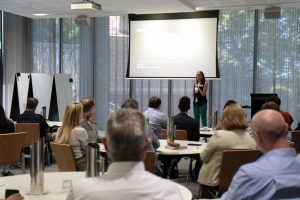WA manufacturers have had direct input on State Government industry strategy, via CCIWA membership.
An Advanced Manufacturing Roundtable Discussion on 10 February, hosted by CCIWA, led to industry and government agreeing on ways to further develop WA’s manufacturing industry.

CCIWA chief executive officer Chris Rodwell
CCIWA and its Members consulted with representatives from Deloitte and the WA Department of Jobs, Tourism, Science and Innovation (JTSI) on the WA Government’s Advanced Manufacturing Strategy.
CCIWA chief executive officer Chris Rodwell said: “WA is home to the mighty energy and metals sector, but also an ecosystem of manufacturing businesses in the supply chain.
“Manufacturing is in competition to be our third-biggest sector, comprising about 5% of our economy in GVA (gross value added) terms.
“Manufacturing is in CCIWA’s DNA; one of the key groups who joined together to form CCIWA in our 130-year history, was the WA Chamber of Manufacturers. We count over 1,000 manufacturers as members.
“Our advanced manufacturers are at the forefront of technologies like 3D printing, automation, robotics, AI. Our dynamic businesses innovate and create within defence industry, aerospace, biotechnology, medical devices, renewable energy and more.”
Discussion outcomes
Attendees agreed that changing security and geopolitical conditions made the components and products their businesses produced, even more important.
There was also consensus that procurement and grants processes with government are slow and complex at both State and Federal level.
Topics and issues discussed

Deloitte’s Kasia Allan
A presentation and discussion led by Deloitte’s Kasia Allan focused on WA’s advantages in manufacturing, such as transferrable skills from the resources sector, as well as challenges, including worker shortages, and rising costs.
There was particularly valuable discussions among manufacturers in the health, defence and chemicals sector. They identified that although specialist skills are in short supply, the government process for nominating a skill as being in shortage relies on large volumes of jobs being advertised. These businesses said although the number of highly-skilled roles may be small compared to other sectors, they are “critical” to the sector.
The need to streamline government processes associated with the use of land was another key discussion point that arose. This included areas such as energy, water, environmental approvals, native title and more, to enable projects to be launched with minimal delay and disruption. Businesses reflected that as they sought to implement their projects, they were acting as liaison between two levels of government, instead of State and Federal departments speaking to each other.
JTSI also presented on the State Government’s priorities for the Federal Government’s National Reconstruction Fund, which included:
- Battery production
- Renewable hydrogen production
- Hydrogen electrolyser manufacturing
- Carbon capture, utilisation and storage
- Low-emissions livestock feed supplements
- Modernising steel and aluminium
- Components for wind turbine manufacturing
- Advanced critical minerals processing
- Decommissioning of oil and gas infrastructure
However, CCIWA’s advanced manufacturing Members cautioned that narrowing down even to these priorities could lead to opportunities being missed.
Want to keep up to-date with the latest business news and advice?
Become a CCIWA Member today and get access to exclusive information designed to help you do business better. Find out more here.











